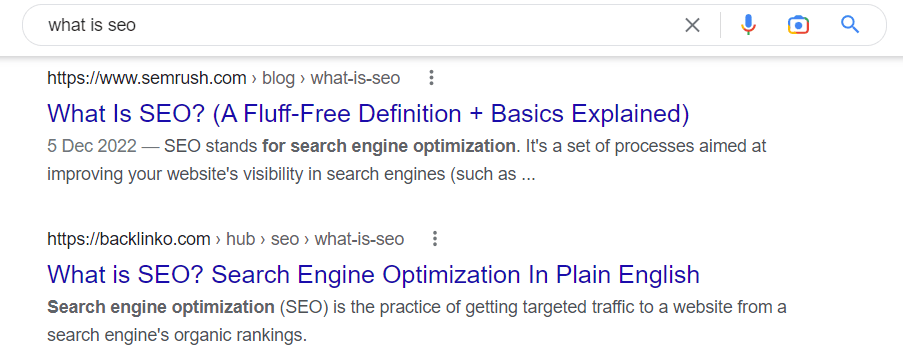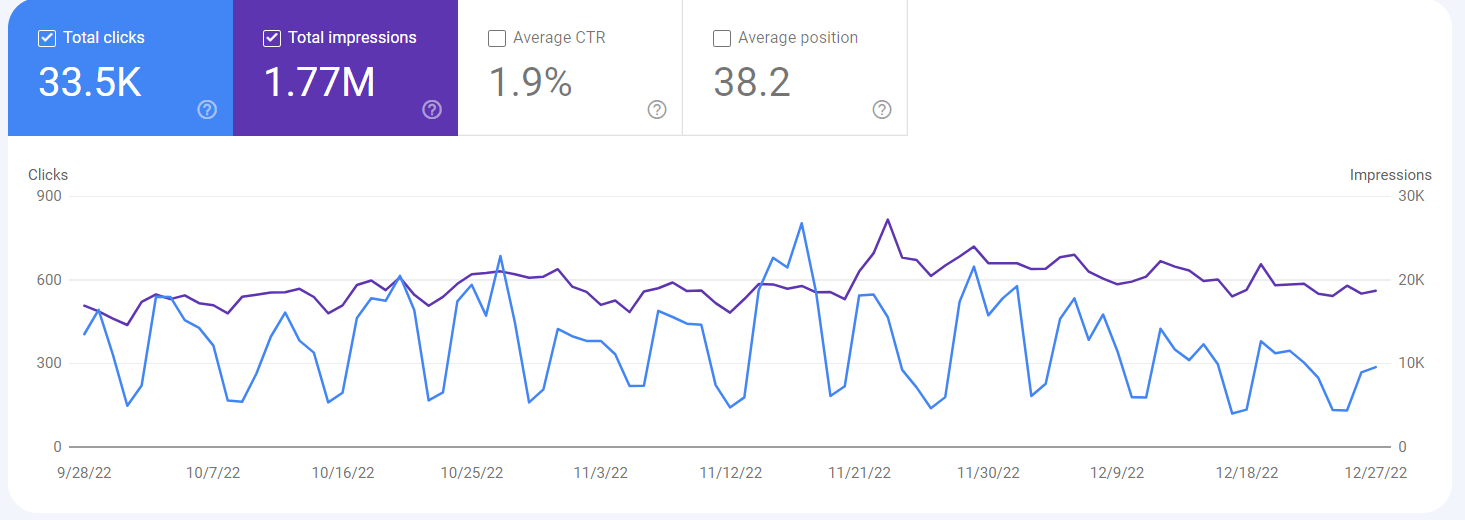If you want to rank well on Google, you’ll need to produce amazing content. This is why applying solid SEO writing to your site is necessary.
SEO writing is different from regular copywriting. It’s a process that blends the technical elements of SEO with strong writing abilities to create content that pleases readers and search engines at the same time.
Get this right and your SEO efforts will perform a lot better.
Follow our guide for everything you need to know about SEO writing, how to do it, and why it’s so important.
What is SEO Writing?
SEO writing, or writing for SEO, is the process of writing content that has been crafted to rank well in search engines. This is very different from regular writing, as it involves a technical element as well as being able to write effectively for readers.
Not every writer is a good SEO writer. This is because SEO writing involves a number of extra steps and processes to make sure that the content is optimised for search engines, and not just for a good reading experience.
SEO writing involves strategically planning content, outlining articles so that they are SEO-friendly, writing the content, optimising the content, and even distributing it properly. Get it right, and your content should perform well in search engines.
Why is SEO Writing Important?
SEO writing is a fundamental part of effective SEO. If your content is properly written and optimised, it will have a major impact on your SEO strategy as a whole.
Here are some of the main reasons why SEO writing is important for your website.
1. Improve Search Rankings
First and foremost, SEO writing is important to help boost your search engine rankings.
An SEO writer will craft content that is authoritative, high-quality, and optimised for search engines. This content must be properly researched so that it targets the right keywords to improve your website’s visibility. Get this right, and you’ll improve the chances of your website ranking well in the search results pages.
2. Get More Traffic
SEO-friendly content is designed to perform well in search engines. When you get this right, it means you’ll be able to attract more traffic to your website.
This involves researching keywords with a high traffic potential, and targeting them strategically so that you can gain more visibility and attract more clicks.
An important part of SEO writing is not just getting the web page to rank, but making sure that it stands apart from the competition and looks appealing to the target audience. This is achieved through well-crafted page titles and meta descriptions.

Even if you get your page ranking on page one, there’s still a lot of tough competition you have to cut through before you can attract the click. A good SEO writer is able to analyse the SERPs accordingly so that the piece of content doesn’t only rank well, but attracts maximum traffic. And the more traffic you attract, the more potential you have to convert this traffic into customers.
3. Gain High-Quality Traffic
SEO is not just about getting a lot of traffic. Instead, it’s about being strategic with what kind of traffic your website attracts. A seasoned SEO writer creates content with the website’s exact target audience in mind.
Beyond researching technical elements to optimise the content around, SEO writing also involves a deep understanding of the website’s audience. Who are you trying to attract to your website? What pain points does your audience have? What will lead them to become a customer? These are all questions SEO writers should answer.
High-quality traffic, or qualified traffic, refers to anyone who lands on your website and is actually interested in what your business does. This is traffic that has a greater chance of converting into customers.
In order to attract qualified traffic, you need to understand the buyer’s journey and ensure you publish the right kind of content for each stage of this journey. This helps you address your target audience’s pain points and provide relevant information when they’re searching for it.
This means when a person finds your website and they land on it, they will be interested in what you do and ready to take the next step. This kind of traffic will add a lot more value to your business.

Image Source: localiq.com
For example, you might run a yoga studio. If you rank at the top position for the keyword “meditation”, you might be able to gain a lot of traffic to your website. However, this traffic won’t necessarily be interested in booking a yoga class with you. If you rank well for a search term like “yoga class” or “yoga studio near me”, then you’ll be able to attract highly qualified traffic – i.e. people who are looking to book a yoga class in your studio.
4. Affordable Marketing
One of the best things about successful SEO is how affordable it is. In fact, it can be completely free if you have a strong grasp of SEO writing.
Let’s say you order SEO-friendly content for your site. If this content performs well in the search engines, you’ll be able to attract a steady stream of traffic from it without paying for that traffic.
Sure, you invest time, effort, or possibly money into writing the content. But once this is done, you can enjoy the benefits of SEO (high-quality traffic) for free.
This is the opposite of running PPC ads on Google, where you have to pay for your traffic. Paid advertising may be a fast and effective way of gaining targeted traffic, but the obvious downside is that you have to pay for it.
Once your web page starts ranking well in the search engine organically though, you can still gain a high level of traffic without spending a cent on it.
This is why SEO is such an excellent marketing investment.
5. Long-Term Results
SEO is a marathon, not a sprint. Even the best SEO writers produce content that can take some time to reach the top of the SERPs. However, once your content starts ranking well, you can reap the rewards of this for a long time to come.
As long as you keep your content updated, it should consistently rank well for the right keywords. Get this right, and you’ll be able to achieve a lot of long-term value from your SEO content.
This only makes the return on investment for SEO writing even more valuable.
What You Need to Know to Be an SEO Writer
As we’ve already established, SEO writing is a totally different process from regular article writing or copywriting. Your goal isn’t to only delight the reader but to make sure search engines can index your content fast and understand it correctly.
To help you out, here are some of the main areas that set apart regular copywriting from SEO writing.
SEO Writing Needs to Be Targeted
The first essential thing to understand about SEO writing is that it’s targeted to rank well for specific search queries. Normal copywriting is only focused on appealing to the reader, but it’s not designed to target specific search terms.
SEO writers achieve this through keyword research and optimization. This is the process of understanding what keywords (search queries) you’re going to optimise the content around. This is a fundamental part of SEO writing.
The first step in becoming an SEO writer is to understand keywords and search intent. This is necessary for being able to produce pieces of content that address the search intent and utilise the keyword correctly. This involves including the keyword in important areas of your text, like your title and metadata, and strategically placing it throughout your copy at the correct density.
Understand the Competition
Writing for SEO is not just about making sure your content is well-crafted for search engines – you also need to make sure it’s better than the competition.
SEO is all about outranking other pages that are competing with you for the same keywords. A core part of SEO writing is finding your SEO competitors and making sure that you produce a piece of content that can do better.
This involves understanding the search intent and producing content in the right format that covers the right information. SEO writers don’t just write from what they think is the best perspective, they have to carefully plan out content based on the competition.
If the top-ranking articles on Google cover more information than yours or address the search query more succinctly, then they will probably outrank your content.
In-Depth SEO Knowledge
SEO writing requires you to understand the various technical elements surrounding SEO.
This includes elements like backlinks and internal links, optimising your keyword usage, correctly formatting your content, using the right alt tags in images, optimising our content for rich snippets, and more. SEO writing doesn’t just stop at writing – the process needs to be aligned with uploading and updating the content.
A good SEO writer needs to have solid writing skills, but they also need a firm understanding of how SEO works.
Strategize Content
Writing is only one part of being a good SEO writer. The rest of it comes down to how strategically the content is planned and optimised. A key area of this is being able to come up with a smart content plan.
SEO writing should involve analysing the competitors, understanding the website’s niche, and having a deep connection with the target audience. This is necessary for discovering keyword gaps and ideas to use in your content plan.
Know How to Use Data
SEO needs to be carefully measured and strategized based on data. If you rely on guesswork, there’s a good chance you’re missing many opportunities.
A key function of SEO writing is to analyse data and make sure the written content is properly structured based on this data. This includes analysing data like keyword metrics, backlink requirements, the traffic potential of keywords, and more. SEO writing should always take a data-driven approach.

For example, when researching the competition and topic, pay attention to the word count of the top-ranking articles, how many sections and titles each article has, how many backlinks the article includes, and what the DA score of the website is. The more data you understand about the topic and competition, the better you will be able to optimise your content to improve your chances of ranking.
Understand E.A.T
A major part of good SEO performance comes down to the quality of the content. As an SEO writer, you need to know exactly how search engines determine the quality and what factors are involved in ensuring your content meets the relevant quality standards. Google’s E.A.T principle is key here.
E.A.T stands for:
- Expertise
- Authoritativeness
- Trustworthiness
According to Google’s Search Quality Rater Guidelines, these are three major factors that Google considers when determining the quality of content. If you’re able to display these three areas in your written content, then you’ll have a better chance of strong SEO performance.
Basically, E.A.T is all about showing Google, and your readers, that your website and the page’s author is a trusted authority on the topic. The more trustworthy and authoritative your content is, the better it will perform.
Provide a Great User Experience
Google and other search engines are smart. They understand their user’s search intent very clearly, and their job is to present the best possible resources for each query. By providing genuine, helpful, insightful, and interesting content for your users, you’ll stand a far greater chance of ranking well.
In the past, SEO writing could have involved “tricking” search engines through processes like keyword stuffing and link-building. These days, algorithms have become more advanced and search engines actually understand when a piece of content provides value to the user.
So, understanding the target audience and producing great content for them is still the most important trait of any SEO writer. Get this right, and you should see a definite improvement in your SEO performance.
6 Best Practices for SEO Writing
There’s a lot that goes into SEO. Here are some of the most important SEO writing best practices to consider.
Use SEO Tools
SEO writers should have a selection of data-driven SEO tools at their disposal. These tools are necessary for researching keywords and content, analysing competitors, running technical SEO audits, optimising content while it’s being written, and more.
The more you utilise AI, tools, and hard data in your SEO strategy, the more focused your strategy will be. This is necessary for achieving great SEO results.
Turn Topics Into Keywords
This is possibly the most important first step in SEO writing. If you want to perform better in search engines, then you need to be able to turn your topic, or niche, into keyword ideas.
The more you can break down a broad topic into various keywords, the better your semantic SEO performance will be. This will help you become a more trusted authority in your niche.
Answer the Public is an excellent free tool to help you gauge what kind of keywords and specific topics are trending based on your main topic or area of focus. You can use this to discover keyword ideas, and then further refine these using an SEO keyword tool.

Promote Your Content
Social validation is important for good SEO performance. It also helps your content be seen by more people straight off the bat, which can help you gain more traffic and speed up the SEO process.
When you write and publish SEO-friendly content, make sure you put enough effort into promoting it. While this is not necessarily a part of “SEO writing”, it’s something that sets regular writers apart from SEO experts. The more you promote and distribute your content, the better it will perform.
Write With Conversion Goals in Mind
SEO writing makes your web page more visible on Google Search. You also need to ensure your page is properly optimised for the traffic that you do attract. This involves understanding your SEO goal and applying various CRO tactics.
Before planning and publishing SEO content, ensure you understand what you want this content to help you achieve. It could be to grow your mailing list, gain direct booking requests, sell products, or more. Whatever the case, your SEO content also needs to entice the user to follow through with this conversion activity. This involves using the right language, highlighting the value of your offer to the user, using appropriate CTAs, and more.
After all, if you attract a lot of traffic but this doesn’t result in any conversions, then your traffic will be kind of pointless.
Continually Optimise
Writing SEO content is the first step. The next step is optimising the existing content after it’s been published.
Doing this makes a massive difference to how well your content performs and how much traffic you can attract. Instead of simply publishing and forgetting, go back to your content after some time and review it to ensure you aren’t missing any opportunities, that your page is indexed for the correct keyword, and that you don’t have any technical issues on your site.
The more you optimise, the better your content will perform.
Add Value
Ultimately, the most important element of SEO writing is to add value to your audience. This should include making sure your content is informative, engaging, entertaining, or interesting.
Ask yourself what your audience wants to find out when they discover your content and make sure you offer this. Also pay attention to other elements of the user experience, like page load speeds and how your content is formatted.
Conclusion
High-quality content is the foundation of any SEO strategy. In order to produce this, you’ll need to get SEO writing right.
Whether you write the content yourself or order it from SEO content writing experts, the way your content is written plays a fundamental role in your SEO success. By incorporating the right technical elements, utilising the right data and research, and displaying a proper understanding of your target audience, you’ll be able to boost your SEO results in a big way.
